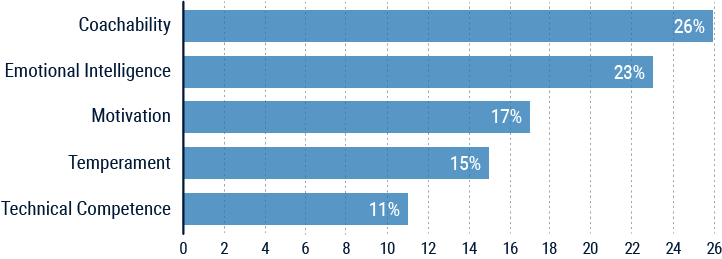12 Best Interview Questions Small Businesses Owners Should Ask

JaiJaime Lizotte is HR Solutions Manager at ComplyRight, a company that helps businesses design and enact effective and efficient practices that meet business and employment regulations. She works to develop HR solutions that solve and simplify HR management for all types of businesses.

In a recent survey by the National Federation of Independent Business, 26% reported they were planning to fill new positions. But it’s easier said than done. In the same survey, 33% of businesses reported an utter lack of qualified applicants for their open positions.
A resume only tells you so much, according to Jaime Lizotte, HR Solutions Manager at ComplyRight. What looks good on paper could be catastrophic in the office.
So, it comes down to the interview.
What Business Owners Can Learn from an Employee Interview
It’s your chance “to see how the applicant responds to questions and scenarios, and to get a more in-depth sense of their work experience,” Lizotte writes in an email. Overall, she writes, you can “get a better idea if they are a good fit for the position and your company’s operating priorities.”
Ideally, interview questions should reveal a candidate’s:
- Background and training: Does this person have the knowledge and skills required to excel at the job?
- Personality: Will this person fit into our environment?
- Behavior: How will this person respond to the rigors of the job and the specifics of our workplace dynamic?
- Ability to improvise: Can this person deal with the unexpected or unfamiliar?
- Thought processes: How does this person solve problems?
How much you learn comes down to what you ask. Here are 12 questions for small business owners that can help you get to the bottom of things and avoid a bad hire.
1. How does your prior work experience relate to this position?
According to Lizotte, the best questions relate directly to the role you want to fill.
“Position-focused questions are designed to determine if a candidate has the knowledge and skills needed to perform the job,” she writes.
But they can reveal more. Listening to them talk about previous experience can tell you a lot. If the position was similar to the one at your company, writes Lizotte, does it seem they actually liked what they were doing?
And if the position is new to them, she adds, “Are there any skills they can bring from their previous position to the new position? Do they have to be fully trained?”
The trick is to be open-ended and let the candidate decide what’s most important to share. Instead of:
“How much experience do you have with InDesign?”
Try:
“Describe a time you used InDesign features in an innovative way to meet the demands of a particular project.”
The second question can reveal not only the depth of their InDesign knowledge, but also their passion for the job, creativity, and problem-solving abilities.
2. How and why did you get started in this line of work?
Because you probably don’t want an employee who designs because it pays more than, say, being an out-of-work actor.
According to career aptitude platform Sokanu, the top three reasons people choose a particular career are:
- Accident
- Apathy
- Social pressure
None of these is a good sign for the success of your new hire.
So try to learn what brought them here in the first place. Was it a childhood dream? Did a bobsledding injury lead to a passion for track design? Did they simply fail at the other 10 careers they’ve already tried?
Ideally, a candidate’s answer shows proactivity, reasoning, an aptitude for the work, and that the job holds some appeal beyond a paycheck.
3. What is most important to you in a company?
Do they value what the company values? A Gallup poll found that only 27% of employees did. Which is bad news all around.
According to Lizotte, the candidate’s answer can “help you get a feel for the type of culture and environment a candidate is looking for.” And it matters. A lot.
“More than ever, candidates are prioritizing finding a company culture and environment that allows them to reach their full potential,” she writes.
If your focus is on creating an extremely collaborative atmosphere, an employee whose greatest concern is the independence a company affords may not work out – for anyone.
“Hiring a candidate that doesn’t mesh well with your company leads to poor work quality, decreased job satisfaction and a potentially toxic environment for both employee and company,” Lizotte writes. “This results in turnover, which has high costs.”
4. How would you describe our business to a potential client?
Does the candidate know your business? How you’re positioning yourself in the industry? How you compare to others in the same field?
Basically: Do they understand what you do and what you’re trying to achieve?
You want to see if they’ve thought about it. If a candidate can sum up your business thoughtfully, accurately, and with interest, that's a good sign. How they respond can reveal their attitude toward the work and the kind of impression they’d make on a client.
5. Who are our main competitors?
If you’re filling a non-entry-level role, and the candidate doesn’t know the industry, you’ve got your training cut out for you. It means your new employee would be starting with a deficit. Which means time and lost revenue.
Perhaps more important, the question will reveal how much research the candidate did before showing up to interview. Candidates who didn’t bother to find out which companies you’re trying to outperform may not bother trying to outperform those companies.
6. Where do you see yourself in five years?
You need to know about this person’s long-term goals. Employee turnover costs a fortune, especially for a high-level role. You’re looking at recruiting and training again for the same position, losing revenue on an empty desk, and another learning curve process that drains your bottom line.
Ask about one year, five years, and even 10 years out. The answers can tell you a lot, including:
- Does this person plan ahead?
- Do this person’s aspiration jibe with your company’s?
- Is this just a detour on the road to what they really want to do?
If the answer suggests a candidate isn’t invested in the work, you may be looking at someone who has no plans to stick around.
7. Tell me about a time when…
In the interview realm, this is “storytelling” territory, where you’ll learn a lot about who this person is and how well they will perform the job. Ask questions like:
- Tell me about a time when you experienced conflict at work. How did you handle it?
- Tell me about a time when you were assigned a task you’d never done before. How did you approach it?
- Tell me about a time when you were faced with an unhappy client. How did you manage the situation?
In this type of question, watch out for fiction: Four out of five candidates lie in interviews, according to a 2013 University of Massachusetts study. Leadership trainer Mark Murphy told Forbes that possible signs of lying include:
- Vague answers : For all but the most experienced liars, it can be tough to come up with specific details on the spot.
- Lots of third-person pronouns: If it’s always “they” instead of “we,” they may not have personally experienced the event.
Of course, they may just be nervous. Job interviews can be trying. The folks at Leadership IQ recommend letting things get awkward: If you get a response that’s a big bunch of nothing, just wait. Silently. Expectantly. And see if they give you more.
A little discomfort now could save you a whole lot of severance down the road.
8. Why did you leave your last job?
Attitude counts for a lot. You don’t want to introduce a toxic element into your happy little workforce.
If the candidate badmouths the last company they worked for, it may be a sign of a bad attitude, anger, a negative approach, or a sense of entitlement… which will just drag everyone down.
If a candidate left (or is leaving) because they “wanted to move beyond an entry-level role and there were no mid-level positions available in the company,” you could be looking at someone with ambition, self-drive, and a desire to do great work.
If a candidate left because their manager “hated me for no reason,” you could be looking at a nightmare.
9. What’s your greatest strength? Greatest weakness?
You can learn a lot from how a candidate portrays their best and worst qualities.
The first thing this question will reveal, of course, is the candidate’s best and worst qualities. If the job is in customer service, and the candidate’s worst quality is irritability under pressure, that may not work out.
But there’s more. A survey by Leadership IQ found the top reason why new employees don’t work out is an inability to take feedback.
Reasons for failed hires

By asking a candidate to assess their own strengths and weakness, you can find out:
- Is this person self-reflective?
- Can this person take criticism?
- Would this person be a complementary addition to your staff?
Also, writes Lizotte, “It allows you to see how a candidate sees themselves.”
“This is actually a very uncomfortable question for most candidates, because they don’t want to sound conceited or speak too highly of themselves,” she writes.
But that can tell you a lot, too.
“The interview is their time to shine, and they should be confident [enough] to answer this question,” writes Lizotte. “It gives an employer valuable insight into their level of self-awareness and commitment to professional growth.”
Especially for managerial roles, she adds, because “managers need to exude confidence in order to supervise other employees … [They need to] believe they are doing a good job, know when to ask questions, and know what they need to improve their skills to be a better manager.”
10. If your computer crashed in the middle of a major project...
Now, obviously, if their computer crashed in the middle of a project, the first thing the person would do is curse. Maybe cry.
But then what would happen? Would they immediately talk to IT? Call the client to say a technical problem may cause a brief delay but is being solved as we speak? Slam the keyboard on the desk and go for a drive?
The exact question depends on the job, but what you want to see is an employee who can handle the unexpected, solve problems logically, and deal with the inevitable hiccups that arise with speed, grace, and reason once the cursing is done.
11. Riddle Me This…
Many experts recommend tossing out some sort of brain teaser (preferably one your current employees can solve fairly quickly. You don’t want to sit there for an hour while the candidate works it out.)
It can show you “how the candidate thinks on their feet or under pressure,” writes Lizotte.
“It may not be the best type of question to ask for every position,” she notes, “but may be useful for management positions, where these types of questions might give you a window into a candidate’s strategic thinking and creative problem-solving skills.”
When you’re hiring for creative positions, you want to know how creative a candidate can be under pressure. You don’t want an employee who freezes like a deer in headlights when a tough question comes up.
Here’s one:
You can buy a ball and a bat for a total of $1.10. The bat costs one dollar more than the ball. How much does the ball cost?
(*We’re against spoilers. Answer at the end of the article.)
Lizotte sees another benefit to the brain teaser: As long as you ask the same one in every interview, it lets you stray from strictly position-focused questions without potentially straying into discrimination zone. More on that in a moment.
12. Any questions for me?
Finally, what does the candidate want to know about the company, the culture, the benefits? You don’t want a passive worker. You want people who research, think, and take all this seriously. You want people who know what they need, what they want, and what they don’t know.
If a candidate has no questions – or the only question is “What’s the pay?” – you could be looking at someone who’s neither discerning nor curious and sees this merely as an inconsequential means to an end.
As a Business Owner: What Questions NOT to Ask in an Interview
Ultimately, the right questions will vary. Shape the process based on the industry and role, and be creative. Get them a little off-balance and see what comes up.
What will not vary, however, are the wrong questions. Legally, you’re discriminating if you ask a candidate anything related to:
- Race
- Nationality
- Age (except “Are you over 18?”)
- Gender
- Sexual orientation
- Disabilities (except “Can you perform all the tasks required for the job?”)
- Marital or family status or pregnancy
This is why Lizotte recommends sticking to position-related questions. She also recommends having a precise plan you apply to every single employee interview: Avoid anything off-the-cuff, even if it seems innocuous.
What you ask may be fair and neutral, she explains, but an answer “could disclose information that reveals if they belong to a protected class,” which puts you in a tough spot. As far as the law is concerned, discrimination that happens by accident is still discrimination. The onus is on the employer to avoid it like the plague.
Look out for problematic disclosures so you can actively “erase them from your memory,” Lizotte writes, adding, “We can’t control how an applicant is going to answer, but we can control what we consider from their answers when making a hiring decision.”
Honing your interview skills is a critical part of the hiring process. According to a Leadership IQ survey, 46% of bad hires failed within 18 months of coming onboard -- and 82% of managers said there were subtle signs in the initial interview.
In the current labor market, this is all even more important. You’re competing for a relatively small number of highly qualified candidates, so you’re likely to meet a lot of the wrong people for the job. A great vetting process is your best bet for avoiding the financial hit of a bad hire.
*Brain teaser answer:
The ball costs $0.05, and the bat costs $1.05.
Big thanks to Jaime Lizotte, HR Solutions Manager with ComplyRight, for her generous assistance with this article.
Learn more insurance options for small and medium-sized businesses. Our independent insurance agents shop around to find you the best coverage.
Jaime Lizotte, HR Compliance Manager, ComplyRight
https://www.leadershipiq.com/blogs/leadershipiq/35354241-why-new-hires-fail-emotional-intelligence-vs-skills
https://www.gallup.com/workplace/243434/time-core-values-audit.aspx
https://www.sokanu.com/blog/how-people-actually-choose-careers/
https://hbr.org/daily-stat/2013/06/vast-majority-of-applicants-li.html
https://www.monster.com/about/a/more-than-half-of-surveyed-u-s-small-business-owners-recognize-the-risks-of-making-the-wrong-hire
https://assets.nfib.com/nfibcom/SBET-May-2022.pdf
https://www.forbes.com/sites/markmurphy/2017/11/12/how-to-tell-if-a-job-candidate-is-lying-in-the-interview/#39d8de4d11e0
https://resources.careerbuilder.com/small-business/5-must-ask-interview-questions-for-small-business-job-candidates
https://hiring.monster.com/hr/hr-best-practices/recruiting-hiring-advice/interviewing-candidates/behavioral-interview-questions.aspx
http://bondstreet.com/how-to-interview-someone/
https://business.linkedin.com/talent-solutions/blog/interview-questions/2016/5-interview-questions-small-businesses-should-ask-candidates-before-your-hire-them
